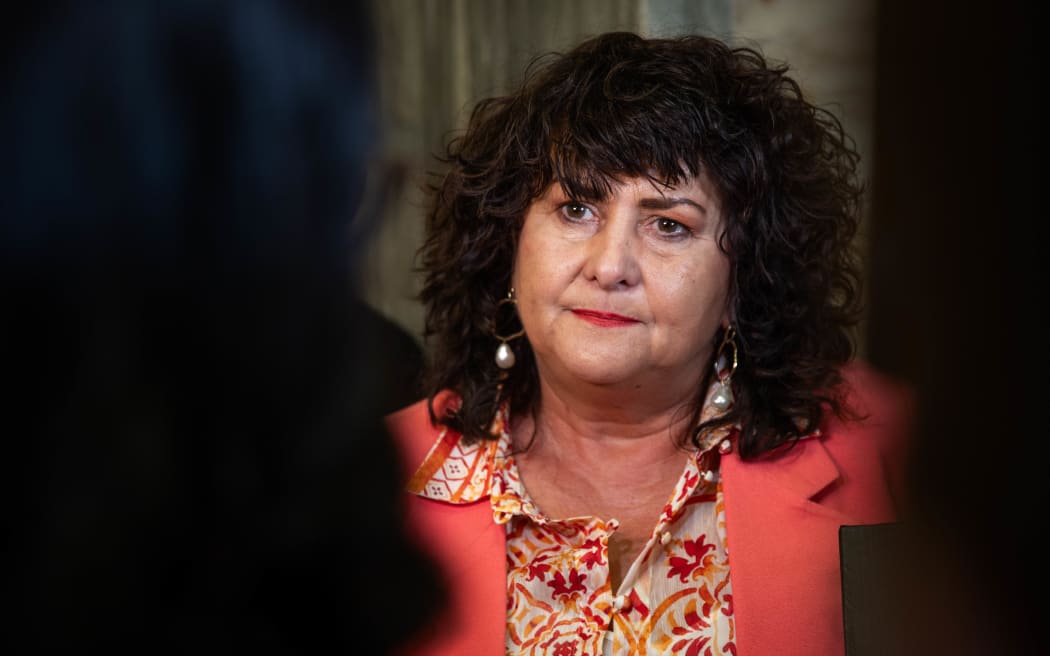
Customs Minister Casey Costello has slashed the excise tax on heated tobacco products. Photo: RNZ / Angus Dreaver
Associate Health Minister Casey Costello has cut the excise tax on Heated Tobacco Products (HTPs), as she aims to make them more attractive as an alternative to smoking.
Costello, who is also Customs Minister, has cut the excise rate on HTPs by 50 percent effective from 1 July - a move silently dropped on the Customs website.
Costello refused to be interviewed by RNZ but a spokesman said she had made the move to reduce the cost of the products to encourage smokers to switch to safer alternatives.
But Janet Hoek, a Professor of Public Health at the University of Otago, told RNZ that the move seemed weighted in favour of the tobacco industry.
"Certainly that is something that tobacco companies would have been keen to see happen," Hoek said. "This is not advice that is coming from the Ministry (of Health). It certainly seems to be advice that is suiting tobacco industry interests."
Tobacco giant Philip Morris owns a leading brand in the HTP market, the IQOS, where sticks of tobacco are inserted into a device and heated, rather than burned.
Philip Morris has lobbied for a cut to the excise tax on HTPs, telling the Tax Working Group in 2018 that the government should "establish a tax rate for heated tobacco products significantly below the tax rate" for tobacco.
In a statement to RNZ Costello said that vaping had been a successful quit-smoking tool and she wanted to see whether HTPs would also be a useful cessation device.
"Vaping does not work for everyone and some attempting to quit have tried several times. HTPs have a similar risk profile to vapes and they are currently legally available, so we are testing what impact halving excise on those products makes."

There is no evidence that Heated Tobacco Products help people to quit smoking, the Ministry of Health says. Photo: 123RF
Documents released by the Ministry of Health show Costello also asked for advice on liberalising the regulation of HTPs but it was opposed to the idea.
"There is no evidence to support their use as a quit smoking tool," ministry officials told her. "We do not recommend liberalising the way HTPs are promoted. This would likely compound existing concerns about youth uptake and addiction to nicotine products."
Costello's interest in smokeless tobacco and nicotine products
Earlier this year the government scrapped Labour's smokefree programme, which health officials had described as an "endgame" for the tobacco industry in New Zealand.
The moves would have slashed tobacco retailers from 6000 to 600, removed 95 percent of the nicotine from cigarettes and created a smokefree generation by banning sales to anyone born after 2009.
Costello says she is committed to the Smokefree 2025 goal and is also considering whether allowing the sale of oral nicotine products, such as snus and nicotine pouches, could help achieve that goal.
The Ministry of Health documents show that in March Costello recommended a Cabinet committee "agree in principle to allow the sale of smokeless tobacco and nicotine products where the evidence shows they are significantly less harmful than smoking".
But the ministry warned Costello against allowing the sale of snus and nicotine pouches.
"On balance, we do not recommend extending the range of nicotine products available for sale in New Zealand," it said. "Additional products will likely compound existing concerns about young peoples' addiction to nicotine for little benefit."
The ministry told Costello there was "weak evidence" snus helped people quit smoking. "The risk of feeling addicted may be higher for snus than for smoked tobacco. Use of snus may increase the risk of certain cancers."

Nicotine pouches "are associated with nicotine dependence and addiction," according to official advice given to Associate Health Minister Casey Costello. Photo: stock.adobe.com
The ministry said nicotine pouches were a new product but there were emerging concerns about them.
"There is not good evidence to date to support their possible use as a reduced harm alternative to smoking and there is currently no evidence of their effectiveness for smoking cessation," officials told Costello.
"There is evidence of them being marketed to children in other countries, and they are associated with nicotine dependence and addiction. Children, adolescents and non-smokers are considered at high risk of dependence."
In Costello's statement to RNZ the Minister struck a more cautious tone on nicotine pouches than was indicated in the Cabinet committee document.
"I have concerns around nicotine pouches, which seem to be targeted at young people," Costello said.
The Associate Health Minister said she would continue to seek advice about the effectiveness and safety of alternatives to smoking.
"If there are smokeless tobacco or nicotine products that are significantly less harmful than smoking - that is, they have a similar risk profile to vaping - then I want advice on whether it's useful to have them available to help people quit smoking," she said.
"The balance we need to strike is that we don't want young people addicted to nicotine. New Zealand didn't have any regulations around vaping until too late and youth vaping got out of hand."
Nicotine pouches, which users place between the gum and the lip to absorb nicotine into the bloodstream, are heavily marketed to young people by influencers on TikTok and Instagram.
Big tobacco companies have seized on nicotine pouches as an alternative revenue stream.
Philip Morris bought Swedish Match, which makes the Zyn brand of nicotine pouches, for $27 billion in 2022.
British American Tobacco, which owns the Velo and Lyft brands of nicotine pouches, has lobbied the government for the products to be legalised here.
"The government's failure to also include smokefree oral nicotine products in the same regulatory framework as vaping products presents a significant missed opportunity for advancing Smokefree 2025," it said in a 2021 submission on the government's smokefree plans.





